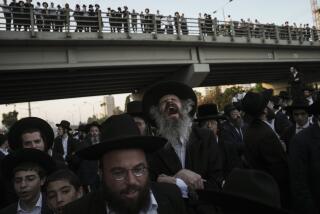MIDEAST : Israeli Group Chips Away at Walls of Religion : Jewish women continue to fight for the right to pray the same way men do at Jerusalem holy site. Even in legal defeats they see hope.
- Share via
JERUSALEM — All they wanted was the right to pray with some of the same spiritual adornments as men--to hold the Torah, to wear a prayer shawl, to sing aloud the ancient praises of God--as they stood before the holiest shrine of Judaism.
But when the 25 women gathered at Jerusalem’s Western Wall in what would become a test case of women’s role in religion and the role of religious authority in a modern democratic state, none expected the fury of the response.
They were beaten with chairs, pelted with mud, spat upon and berated as “pigs” by ultra-orthodox men and women alike. They ultimately were dragged off by Israeli police for violating traditional interpretations of religious law.
Five years later, the group, now known as the Women of the Wall, appeared to suffer another defeat this week, this time at the hands of Israel’s legal system.
In a nearly 200-page ruling, the Israeli Supreme Court on Wednesday rejected the group’s petition asking Israel’s legal authorities to protect the right of all Jewish women to pray as they wish at the very soul of Judaism, the 2,000-year-old wall that is the only remnant of King Solomon’s temple in Old Jerusalem.
The court’s decision went beyond simply upholding the religious status quo at the wall, where the chief rabbi has evoked religious tradition to bar women from many of the prayer rituals permitted for men. In doing so, the three-judge panel underscored the inherent dilemma in balancing religion and law in a modern state that was founded on religion.
Chief Justice Meir Shamgar responded to the women’s argument that there is nothing in strict rabbinical law preventing them from wearing prayer shawls or reading from the Torah in the women-only section of the wall. He recommended that the Israeli government appoint a committee to determine the legal rights of all Jews--male or female, Orthodox or Reform--who pray at the wall.
“In my opinion,” he wrote, “it is necessary to find other practical ways in which any person wishing to appeal to his creator in prayer will be permitted to do so in his own method and fashion.” He added, though, “this should not present an actual offense to the prayers of others.”
For the Women of the Wall, the majority of whom are Orthodox Jews, that recommendation alone was cause for hope--for some, in fact, celebration.
“This is a landmark decision,” declared Bonna Haberman, one of the group’s founders. “It’s what we wanted to have happen. We want the Israeli system to appreciate that there are different strands of religious practice, and that’s exactly what this decision satisfies.
“There cannot be a victory in a case like this,” she added. “There can only be the beginning of a process by which the Israeli public will be educated--not only the Israeli public but the world community.”
Anat Hoffman--another Women of the Wall activist whose position as Jerusalem city council member testifies to the liberated role of women in other aspects of society--was more circumspect.
“We didn’t win,” she said but added that the court did break new ground for women’s rights simply with its decision “to order the government to look into this, to recognize the fact that we are there, that women exist. The emancipation of women in religion is the final frontier. And we are all moving in the right direction.”
Another Israeli high court ruling this week bolstered Hoffman’s optimism. She was among the Reform and Conservative Jews who appealed to the court in a separate case seeking to permit their membership on Israel’s religious councils, which traditionally have been reserved for Orthodox Jews. In that case, the court ruled clearly in favor of weakening the grip of orthodoxy on daily life in Israel.
And, just as Israel’s religious orthodoxy found cause for criticism and concern in both verdicts, the Women of the Wall saw a common thread of change. “Most Jews in the world are not Orthodox,” Hoffman said. “And over half the Jews in the world are women. It’s a great day for the majority. The majority won today.”
But the very next day, they suffered another setback: On Thursday morning, a group of 18 women again approached the wall with shawls and Torahs. They were taken away by police before they could complete their prayers.
Times researchers Dianna M. Cahn and Emily L. Hauser contributed to this story.
More to Read
Sign up for Essential California
The most important California stories and recommendations in your inbox every morning.
You may occasionally receive promotional content from the Los Angeles Times.













